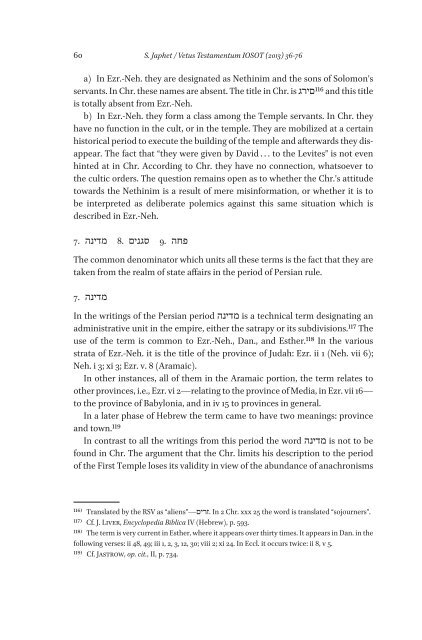Special Issue IOSOT 2013 - Books and Journals
Special Issue IOSOT 2013 - Books and Journals
Special Issue IOSOT 2013 - Books and Journals
You also want an ePaper? Increase the reach of your titles
YUMPU automatically turns print PDFs into web optimized ePapers that Google loves.
60 S. Japhet / Vetus Testamentum <strong>IOSOT</strong> (<strong>2013</strong>) 36-76<br />
a) In Ezr.-Neh. they are designated as Nethinim <strong>and</strong> the sons of Solomon’s<br />
servants. In Chr. these names are absent. The title in Chr. is םירג 116 <strong>and</strong> this title<br />
is totally absent from Ezr.-Neh.<br />
b) In Ezr.-Neh. they form a class among the Temple servants. In Chr. they<br />
have no function in the cult, or in the temple. They are mobilized at a certain<br />
historical period to execute the building of the temple <strong>and</strong> afterwards they disappear.<br />
The fact that “they were given by David . . . to the Levites” is not even<br />
hinted at in Chr. According to Chr. they have no connection, whatsoever to<br />
the cultic orders. The question remains open as to whether the Chr.’s attitude<br />
towards the Nethinim is a result of mere misinformation, or whether it is to<br />
be interpreted as deliberate polemics against this same situation which is<br />
described in Ezr.-Neh.<br />
פחה .9 סגנים .8 מדינה .7<br />
The common denominator which units all these terms is the fact that they are<br />
taken from the realm of state affairs in the period of Persian rule.<br />
מדינה .7<br />
In the writings of the Persian period מדינה is a technical term designating an<br />
administrative unit in the empire, either the satrapy or its subdivisions.117 The<br />
use of the term is common to Ezr.-Neh., Dan., <strong>and</strong> Esther.118 In the various<br />
strata of Ezr.-Neh. it is the title of the province of Judah: Ezr. ii 1 (Neh. vii 6);<br />
Neh. i 3; xi 3; Ezr. v. 8 (Aramaic).<br />
In other instances, all of them in the Aramaic portion, the term relates to<br />
other provinces, i.e., Ezr. vi 2—relating to the province of Media, in Ezr. vii 16—<br />
to the province of Babylonia, <strong>and</strong> in iv 15 to provinces in general.<br />
In a later phase of Hebrew the term came to have two meanings: province<br />
<strong>and</strong> town.119<br />
In contrast to all the writings from this period the word מדינה is not to be<br />
found in Chr. The argument that the Chr. limits his description to the period<br />
of the First Temple loses its validity in view of the abundance of anachronisms<br />
116) Translated by the RSV as .זרים—”aliens“ In 2 Chr. xxx 25 the word is translated “sojourners”.<br />
117) Cf. J. Liver, Encyclopedia Biblica IV (Hebrew), p. 593.<br />
118) The term is very current in Esther, where it appears over thirty times. It appears in Dan. in the<br />
following verses: ii 48, 49; iii 1, 2, 3, 12, 30; viii 2; xi 24. In Eccl. it occurs twice: ii 8, v 5.<br />
119) Cf. Jastrow, op. cit., II, p. 734.








![Am HaSefer [Volk des Buches] - Books and Journals](https://img.yumpu.com/20648352/1/174x260/am-hasefer-volk-des-buches-books-and-journals.jpg?quality=85)







